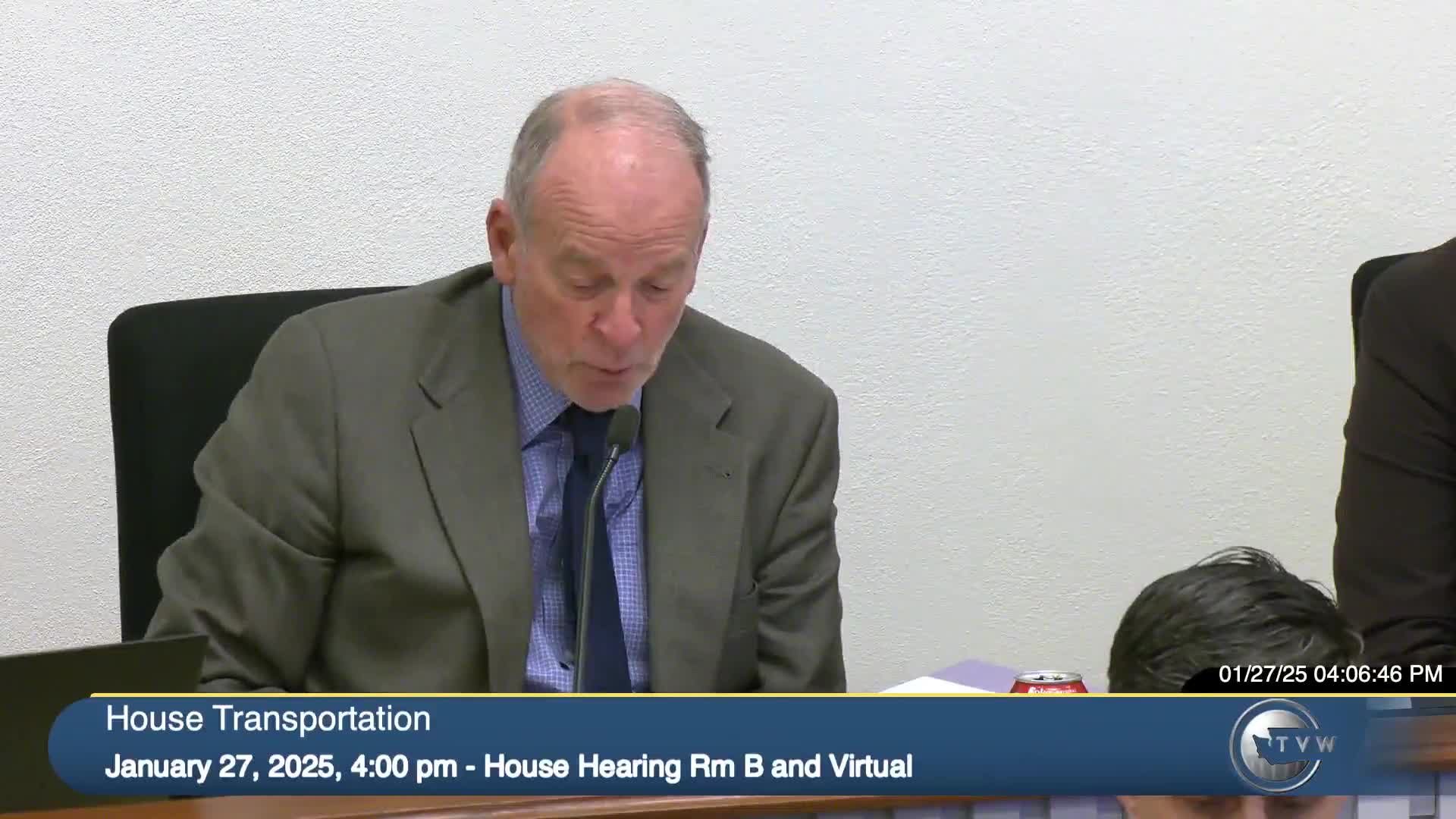Committee hears bill to move Washington toward electronic vehicle titles while preserving same‑day paper option
Get AI-powered insights, summaries, and transcripts
Subscribe
Summary
The House Transportation Committee on Jan. 27 heard House Bill 1283, which would make electronic title records the default for vehicles and vessels while allowing applicants to immediately obtain a printed paper title at the time of application for a $50 fee.
The House Transportation Committee on Jan. 27 heard House Bill 1283, which would change how Washington issues certificates of title for vehicles and vessels by making electronic records the default and allowing applicants to request printed “paper titles” at the time of application for a $50 fee.
The bill matters because it would shift most vehicle ownership records into an electronic system while preserving an option for immediate paper documentation at sub‑agent and county auditor offices. Proponents said the change would cut mail delays and reduce opportunities for theft of mailed titles; opponents — including county auditors and the Department of Licensing (DOL) — urged delay until a state feasibility study is complete and warned of substantial implementation costs.
Michael Hirsch, staff to the committee, summarized the bill’s main effect: that “a certificate of title for a vehicle or vessel may only be issued as an electronic record of ownership unless the applicant applies for a paper title under the paper title process and pays the $50 paper title fee.” He said paper titles would generally be printed at the time of application except where DOL restricts or requires processing delays. The bill would also allow a DOL‑appointed sub‑agent to remove liens on electronic records.
Sandy Myers, committee staff, presented the fiscal note and the Department of Licensing’s cost estimate. Jill Johnson, legislative and projects manager at the Department of Licensing, told the committee that the department’s preliminary estimate includes substantial staffing and IT changes. Johnson said the department currently contracts with “less than 500” financial institutions for electronic titling and that the system is not scalable to the thousands of dealers and potentially hundreds of thousands of lenders that would need access under the bill. She said the department’s staffing estimate is roughly 30 full‑time equivalents and cited one‑time IT redesign costs identified by DOL. Johnson said the projected ongoing costs include about 30.2 FTE and roughly $8.5 million, and that DOL had identified about $2.2 million in one‑time IT costs to update systems to support both electronic and paper workflows.
Thad Duvall, Douglas County auditor and co‑chair of licensing for the County Auditors Association, urged caution. “We’re testifying with concerns on this bill that, it’s premature until we can see the results of that study,” Duvall said, referencing an ongoing DOL‑led feasibility study with Burke Consulting that he said is expected later this year.
Representatives of sub‑agents and independent dealers argued for the proposal’s immediate consumer benefits. Jenna Beauchene, vice president of the Vehicle Sub Agents Tomorrow Association and owner‑operator of Parkland Auto Licensing, said sub‑agents handle “75 to 80% of all licensing transactions annually” and pressed that same‑day paper issuance would improve service across urban and rural communities. Sherry Adams, president of the association, said the bill “uses existing fees and redistributes how they are collected” and that issuing titles the same day would “reduce the number of people handling the documents” and the risk of mailed titles being lost or stolen.
Chester Baldwin of the Vehicle Sub Agents Tomorrow Association described the customer experience under the bill: “You hand the title to the owner as they walk out of the office, which I think is about as secure as it can get,” he said, arguing that same‑day issuance reduces reliance on the mail and shortens the 6‑to‑8 week wait many customers currently face.
Representative Bill Lowea (sponsor of the bill) framed the proposal as a two‑pronged approach: streamline the paper‑title process now and move toward statewide electronic titling in a later phase. Lowe said other states have implemented e‑titling and cited examples; he said he is willing to work with stakeholders to amend the bill’s fiscal impact and pursue the larger electronic transition after DOL’s study and additional work.
Opponents repeatedly urged that the Legislature wait for DOL’s feasibility study, currently underway, and to refine how lenders, out‑of‑state transfers and other stakeholders would interact with an e‑title system. DOL and county auditors told the committee the bill as drafted would require broad contract and technical changes and projected indeterminate revenue impacts but increased costs for local governments to alter titling systems.
The public hearing concluded with committee direction to staff and a note that proponents and DOL would continue discussions about staging, carve‑outs for vehicles without liens, and the scope of lender participation. The committee then closed the public hearing for HB 1283 and moved to the next item on the agenda.
